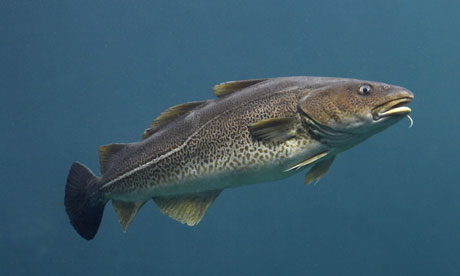Out of Nowhere Comes an Updated Stock Assessment on Cod!
On Friday, I quipped in a post headline, Didja Ever Notice NOAA Drops the Bad News on Friday Afternoon, Then gets Outta Dodge for the Weekend?
Statement Regarding New Information Showing Continued Decline of Gulf of Maine Cod Stock. <Link>
It happens every Friday, mostly from NOAA/NMFS, or NOAA Fisheries, their feel good phony name that includes the two agencies, even if the notice is from NMFS. They like to drop the bomb, then split. The people affected churn their guts out, while the pampered bureaucrats enjoy the weekend off. I have a very hard time thinking they worry about the devastation situation. It was no different last Friday, when I mocked them for it, then spread it around. Thinking about my chore of finding more news, I gave it nary another thought. I was waiting for the significance of the report.
Of course, there were two articles about it in the Boston Globe – Gulf of Maine’s cod stock falling, study says here, and Gulf of Maine Cod Stock at All-Time Low here over the weekend, a continuance bad news fishing articles.
From the article: The cod population in the Gulf of Maine is plummeting more steeply than previously thought, according a new assessment by the federal agency that monitors the fishing industry.
“This is pretty dire,” said Russell Brown, deputy science and research director of the Northeast Fisheries Science Center, the branch of NOAA that did the research.
“My number one concern is that it doesn’t match with what we’re seeing on the water,” said Terry Alexander, a council member and a fisherman from Harpswell, Maine, who has caught cod for nearly 40 years.
E.F. “Terry” Stockwell, chairman of the council, “Over the years, as this stock has continued to decline, the council has repeatedly cut cod catches to promote stock rebuilding,” he said in a statement. “At the same time, we have been very aware of the huge economic consequences shouldered by the fishing industry. As such, we are extremely disheartened about the current situation.”
Peter Baker, director for Northeast fisheries programs for the Pew Charitable Trusts, an environmental advocacy group based in Philadelphia, said the latest data proved that the council needs to do more to protect habitats and spawning grounds. He urged the council to avoid opening areas now closed to cod fishing, as members are now considering for several large areas.
“Cod are going to go into commercial extinction if we don’t protect the habitat they need to spawn and survive,” he said. “Cutting catch limits without protecting habitat has proven to be a failure.” Read Peters Pew Article
This news is devastation to those that have done every thing they’ve been asked of to rebuild stocks, only to be kicked in the nuts again. And again, and again.
A quote from GDT: “We had no sense this was coming,” said Jackie Odell, executive director of the Northeast Seafood Coalition. Odell declined further comment until she receives a full briefing at today’s NEFMC meeting from staff at NOAA’s Northeast Fisheries Science Center, which performed the assessment.
The letter from Russell Brown, Acting Science and Research Director, NESC
UNITED STATES DEPARTMENT OF COMMERCE National Oceanic and Atmospheric Administration \NATIONAL MARINE FISHERIES SERVICE
Northeast Fisheries Science Center 166WaterStreet WoodsHole,MA02543-1026
August1,2014
To: E. F. Stockwell, III Chairman, New England Fishery Management Council
50WaterStreet;Mill2 Newburyport,MA 01950
We are writing to inform you that the Northeast Fisheries Science Center has completed an update of the Gulf of Maine cod stock assessment, and requests the Council’s assistance in completing a peer review of this work.
First, some background on what led us to conduct the update. We have received numerous requests from the councils and industry over the years to provide more timely information on stock condition and to provide advance notice when we see early indications of changes in stock condition. As a result, the Northeast Fisheries Science Center has been developing ways to streamline the process for assessment updates. The intent of the effort is to develop a mechanism to alert managers to new signals observed in survey, catch, or other data collected between full assessments.
Upon examining the most recent survey data for Gulf of Maine cod, all major indicators of stock health appear to have deteriorated since the 2012 assessment. Given the information on Gulf of Maine cod and the availability of catch and age data for 2012 and 2013, we chose to do an updated assessment for Gulf of Maine cod.
Specifically, this assessment was selected for our trial because(1) we noted that all three survey indices(NEFSC spring survey; NEFSC fall survey; and Massachusetts DMF spring survey) in recent years declined to record low levels; (2)age data, survey indices, and prorated catch were all up to date through 2013 and available for use; (3) because of the recently conducted benchmark assessments for this stock, the data processing routines necessary to prepare data for use in assessments were in a high state of readiness; and (4)it is relatively complex, with two assessment models. If the new approach could be successfully used to produce a concise and timely update for this stock, then it would be easier to use for less complex assessments.
In conducting the update, it became apparent that virtually all indicators of Gulf of Maine cod stock condition have deteriorated since 2012 when the last assessment was conducted, and prospects for improvement as well as rebuilding are dimming:
*Spawning biomass levels are estimated to be at 3 to 4 percent of the biomass target for maximum sustainable yield.
*Fishery resource survey indices and spawning stock biomass are at all-time lows.
The intent of undertaking this assessment update was part of a larger effort to develop a more efficient process for generating information on stock status. However, once the preliminary results of the assessment update became clear, we felt it was important to share what we have learned given the apparent grave condition of this stock.
We are requesting the Council’s assistance to conduct a peer review of the stock assessment up date with the participation by its Scientific and Statistical Committee. We discussed some peer review options with the Council Executive Director and hope you can soon finalize a plan for the peer review. Our staff stands ready to work collaboratively with you to accomplish the peer review, so that updated assessment results can be used to inform management decisions.
Sincerely,
Russell W. Brown,Ph.D.
Acting Science and Research Director
cc: R.Beal
Bullard
Moore
New England Fishery Management Council Response
The receipt of more bad news about the condition of Gulf of Maine cod is of serious concern to all New England Fishery Management Council members. Over the years, as this stock has continued to decline, the Council h
as repeatedly cut cod catches to promote stock rebuilding. At the same time, we have been very aware of the huge economic consequences shouldered by the fishing industry. As such, we are extremely disheartened about the current situation reported to us by the Northeast Fisheries Science Center. We will continue to work closely with them as briefings, discussions about a peer review, and other plans are developed in order to promote a coherent response to the situation. The Council remains committed to its NOAA partners and the regional fishing community as we address this daunting challenge.
Mr. E.F. “Terry” Stockwell Chairman, New England Fishery Management Council
50 Water Street, Mill 2 Newburyport, MA 01950
I find some interesting points to ponder.
Why, all of a sudden is the NESC churning out stock assessments they said they couldn’t do, and just how streamlined are they?
Is the catch data of a skeletonized New England fishing fleet that are chasing fish that have decided they find it nicer in cooler water being used against them?
With a multitude of articles and studies referencing fish migrations world wide shifting towards the poles, why is there no computer model input for changing eco conditions?
And why do people like Peter Baker ignore the reality of climate change on fish stocks, pushing for more closed area’s for recovery of fish that are no longer there, but are being replaced with Black Sea Bass?
Why, oh why is there no predator/prey data used in these assessments?
This impromptu assessment that the New England fishermen have ben blessed with has the potential to lock down the entire fishery.
Do not let this happen.
Leave comments her. You too, Russ, Pete. and anyone else






